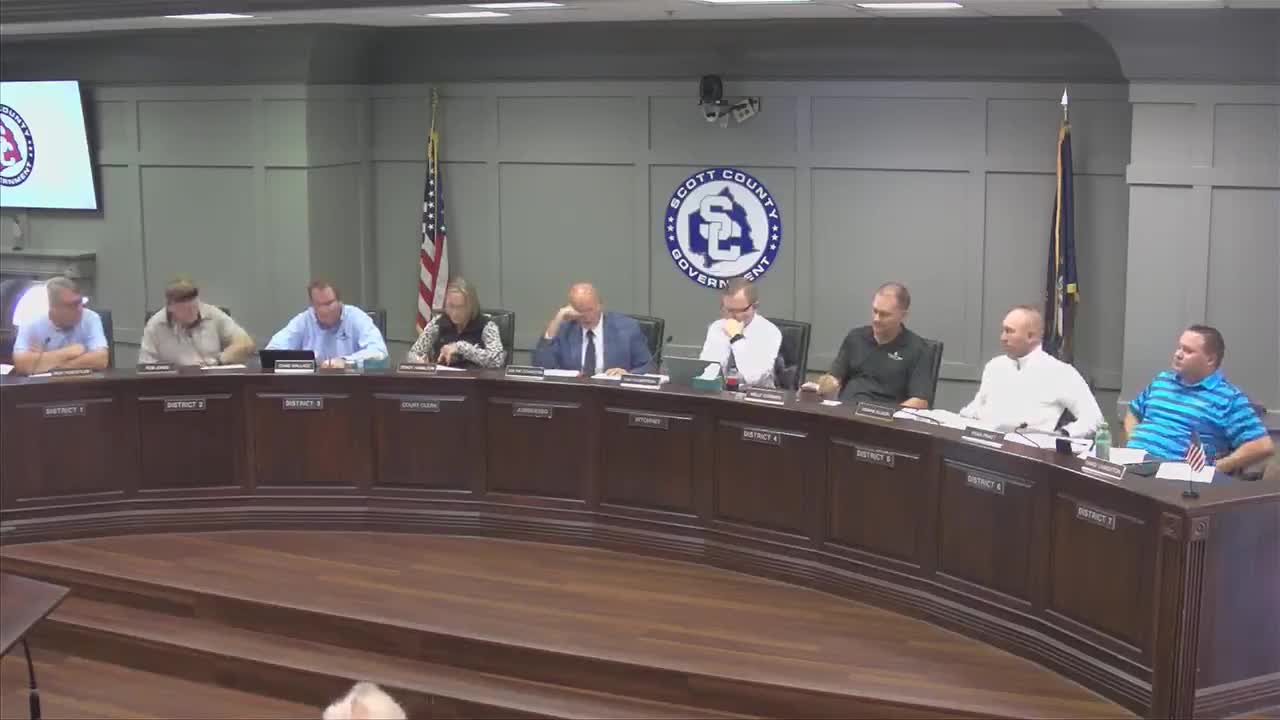Scott County approves first reading of RV campground zoning ordinance with amendments after extended debate
Get AI-powered insights, summaries, and transcripts
Subscribe
Summary
The Scott County Fiscal Court held a lengthy public discussion and approved the first reading of Ordinance 25-03, which adds definitions and standards for RV campgrounds. The court adopted several amendments — including an accessory-use carve-out, language edits, and access/roadway changes — and scheduled a second reading with a clean copy.
Scott County Fiscal Court on Nov. 14 completed the first reading of Ordinance 25-03, a zoning amendment to add definitions and development standards for recreational vehicle (RV) campgrounds and related agricultural recreational uses, following extensive public comment and a series of amendments.
Planning staff read the ordinance and summarized its key components, including expanded definitions for RV campgrounds, cabins and lodges, and specific-use regulations addressing lot layout, landscaping, utilities, roadway and application criteria. Holden of the planning staff told the court the draft represents the planning commission’s recommendations after public hearings and committee review.
Attorney Jeff Murphy, speaking for the Kentucky Bluegrass Experience Resort, urged caution, saying the draft contains numerous specific standards that together look like a hard checklist and asserted they could remove the court’s discretion on future zone-change requests. "There's about—I counted at least 36 embedded requirements in here, which have become a negative checklist," Murphy said, arguing the draft could mean “you will never have a new RV park in Scott County because nobody is gonna be able to meet all those conditions.” Planning supporters responded that the current draft reduced requirements from the prior ordinance and that the rules are community-informed.
Magistrates focused on three recurring concerns: whether small accessory uses tied to farms or events (limited to five or fewer RVs) should be exempt from the most onerous development standards; the liability and pollution-insurance requirement being proposed for operators with on-site wastewater or private sewer systems; and how access and secondary-entry thresholds should align to emergency and development standards.
On the accessory-use question, the court adopted an amendment carving accessory-use RV campgrounds out of the ordinance’s insurance, paved-internal-roadway and certain specific sewer requirements and instead placing them under the conditional-use permit (CUP) process while making them subject to WEDCO and development standards. That amendment passed on recorded vote (Hostetler Yes; Jones No; Wallace Yes; Corman Yes; Ellison Yes; Pratt Yes; Judge Covington Yes).
The court also approved a language change replacing the term "predominant" with "prevalent" in a section intended to align ordinance language with the comprehensive plan. Magistrates debated and ultimately declined to retain a redlined easement-consent requirement that would have required written consent from impacted property owners before certain easement uses; that amendment failed on roll call. The court adjusted the access matrix so that larger campgrounds would require multiple full-time public entrance connections (the group agreed to clarify thresholds so that two full-time public entrances would be required at the 200-site threshold).
Judge Kevin Covington said a clean, amended copy of the ordinance will be circulated before the next meeting and that the second reading will include the approved edits. "We'll have this on the agenda at our next meeting," he said. The court completed the first reading "as amended" by roll call (several magistrates recorded voting in favor; Rob Jones recorded a 'no' on the final first-reading vote).
What happens next: The ordinance remains at first reading; the court directed staff to produce a clean, redlined copy reflecting the amendments for the second reading and public review.
